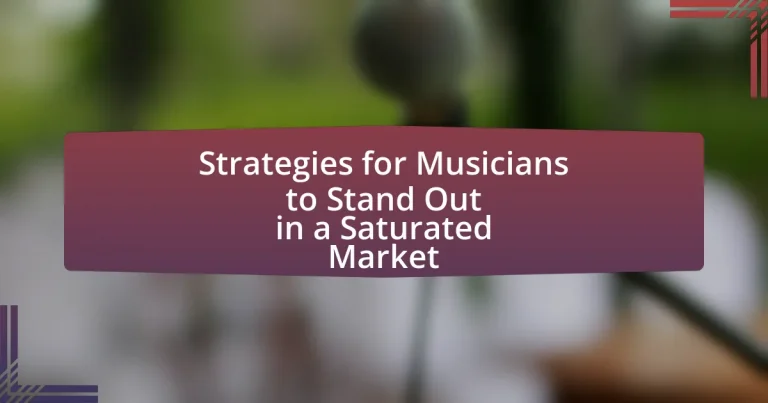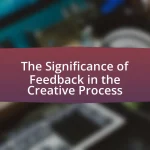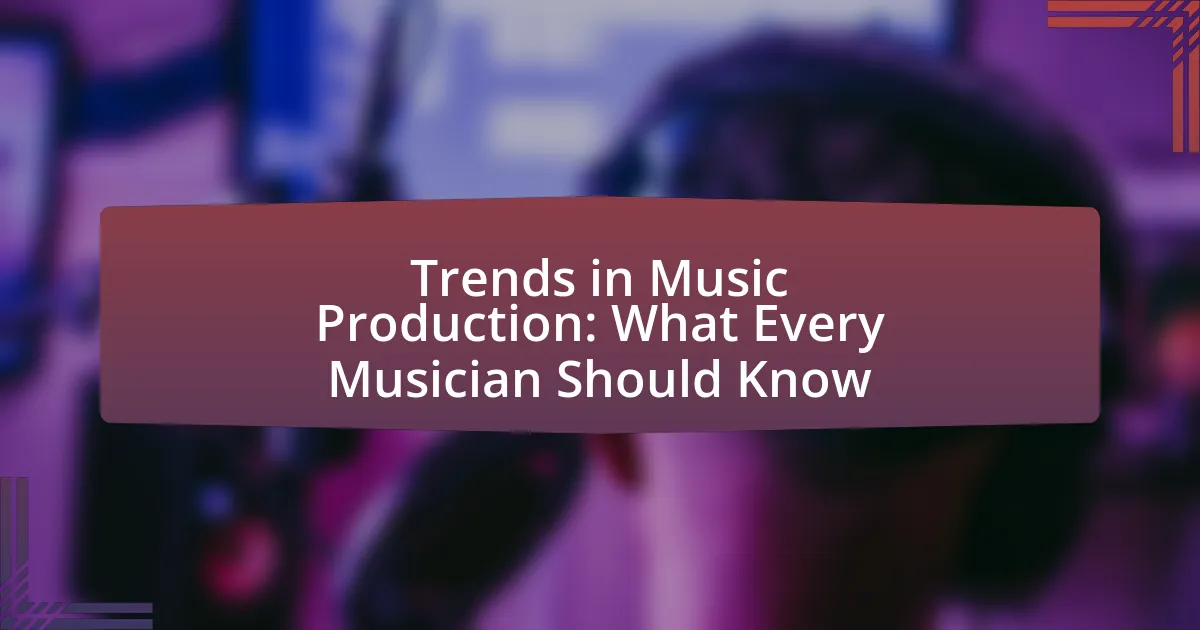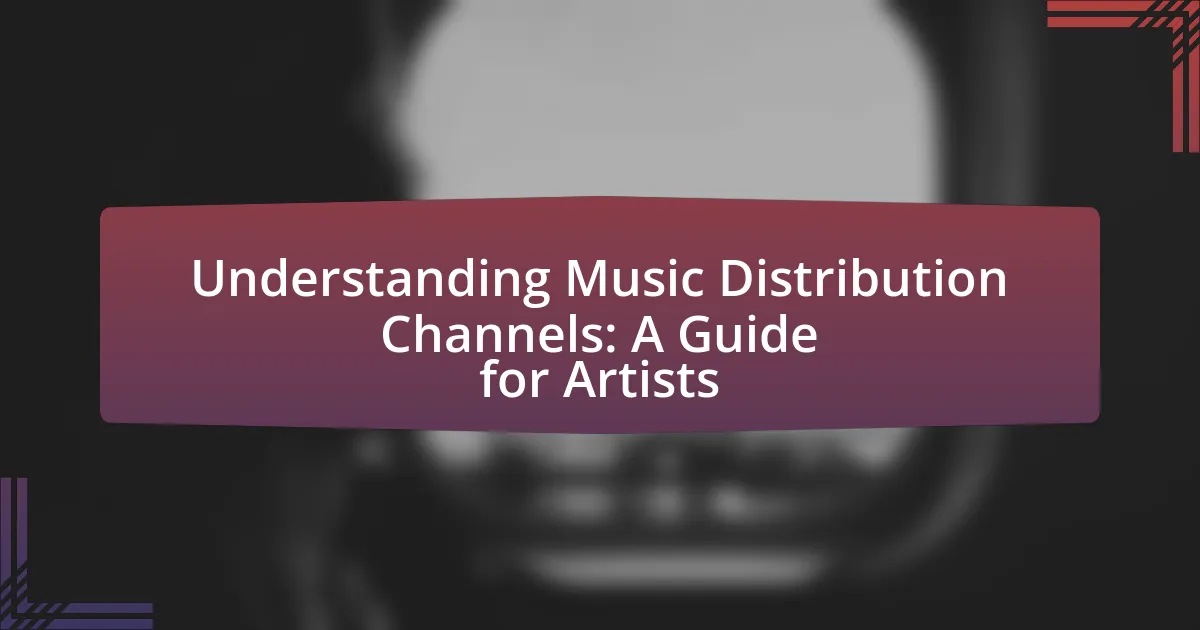The article focuses on strategies for musicians to stand out in a saturated market, addressing key challenges such as intense competition, audience engagement difficulties, and limited financial resources. It explores the impact of competition on visibility, the factors contributing to market oversaturation, and the importance of differentiation for success. Additionally, the article outlines effective marketing techniques, the role of social media, and the benefits of collaborations, while providing practical tips for musicians to enhance their branding and networking efforts. Overall, it emphasizes the necessity for musicians to develop a unique identity and engage authentically with their audience to thrive in a crowded industry.
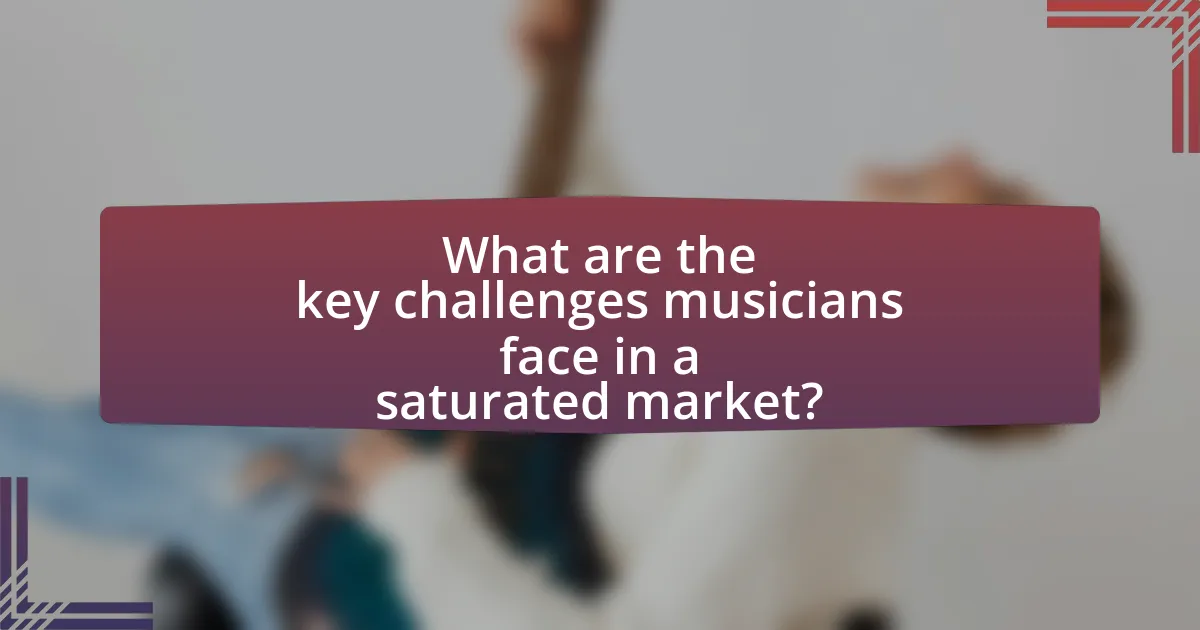
What are the key challenges musicians face in a saturated market?
Musicians face several key challenges in a saturated market, primarily including intense competition, difficulty in audience engagement, and limited financial resources. The intense competition arises from the sheer volume of artists and content available, making it hard for individual musicians to gain visibility. Difficulty in audience engagement stems from the overwhelming choices available to listeners, leading to shorter attention spans and a lack of loyalty to specific artists. Limited financial resources often restrict musicians’ ability to invest in marketing, production quality, and promotional activities, further hindering their chances of success. These challenges are supported by industry reports indicating that over 60% of new music released each year goes unnoticed, highlighting the struggle for musicians to stand out.
How does competition impact a musician’s visibility?
Competition significantly impacts a musician’s visibility by creating a crowded marketplace where numerous artists vie for attention. This saturation forces musicians to adopt innovative marketing strategies and differentiate their unique sound or brand to stand out. For instance, a study by the International Federation of the Phonographic Industry (IFPI) in 2021 highlighted that over 60% of consumers discover new music through streaming platforms, where competition is fierce, emphasizing the need for effective promotional tactics. Consequently, musicians must leverage social media, collaborations, and live performances to enhance their visibility amidst the competition.
What factors contribute to the oversaturation of the music market?
The oversaturation of the music market is primarily driven by the ease of digital distribution and the proliferation of social media platforms. Digital platforms like Spotify and Apple Music allow artists to release music without traditional gatekeepers, leading to an influx of new content. Additionally, social media enables artists to promote their work directly to audiences, resulting in a constant stream of new music and artists vying for attention. According to a report by the International Federation of the Phonographic Industry (IFPI), over 40,000 new tracks are uploaded to streaming services daily, illustrating the sheer volume of content contributing to market saturation.
How do consumer preferences influence competition among musicians?
Consumer preferences significantly influence competition among musicians by determining which artists gain popularity and market share. When listeners favor specific genres, styles, or themes, musicians adapt their offerings to align with these preferences, leading to a competitive environment where artists strive to meet consumer demands. For instance, the rise of streaming platforms has shown that artists who produce music that resonates with current trends, such as collaborations or viral challenges, often achieve greater visibility and success. This dynamic is evidenced by the success of artists like Billie Eilish, who tailored her sound to appeal to younger audiences, thereby outpacing competitors in the pop genre.
Why is it important for musicians to differentiate themselves?
It is important for musicians to differentiate themselves to establish a unique identity that attracts and retains an audience. In a saturated market where thousands of artists compete for attention, a distinct sound, style, or message helps musicians stand out and fosters a loyal fan base. Research indicates that artists with a clear brand identity are more likely to achieve commercial success; for instance, a study by the University of Southern California found that musicians who effectively communicate their uniqueness can increase their streaming numbers by up to 30%. This differentiation not only enhances visibility but also allows musicians to connect more deeply with listeners, ultimately leading to greater opportunities for collaboration and growth in their careers.
What are the risks of not standing out in the music industry?
Not standing out in the music industry significantly increases the risk of obscurity and commercial failure. In a saturated market where thousands of artists compete for attention, those who fail to differentiate themselves are likely to be overlooked by audiences and industry professionals alike. According to a 2021 report by the International Federation of the Phonographic Industry, over 60,000 new tracks are uploaded to streaming platforms daily, highlighting the intense competition. This lack of visibility can lead to diminished opportunities for live performances, collaborations, and record deals, ultimately resulting in reduced revenue and career longevity.
How can a unique identity benefit a musician’s career?
A unique identity can significantly benefit a musician’s career by enhancing their marketability and fostering a loyal fan base. When musicians establish a distinct persona, they differentiate themselves from competitors, making it easier for audiences to remember and connect with them. For instance, artists like Lady Gaga and David Bowie have successfully utilized unique identities to create memorable brands, leading to increased sales and concert attendance. Research indicates that musicians with a strong personal brand can achieve up to 30% higher engagement on social media platforms, which translates to greater visibility and opportunities in the industry.
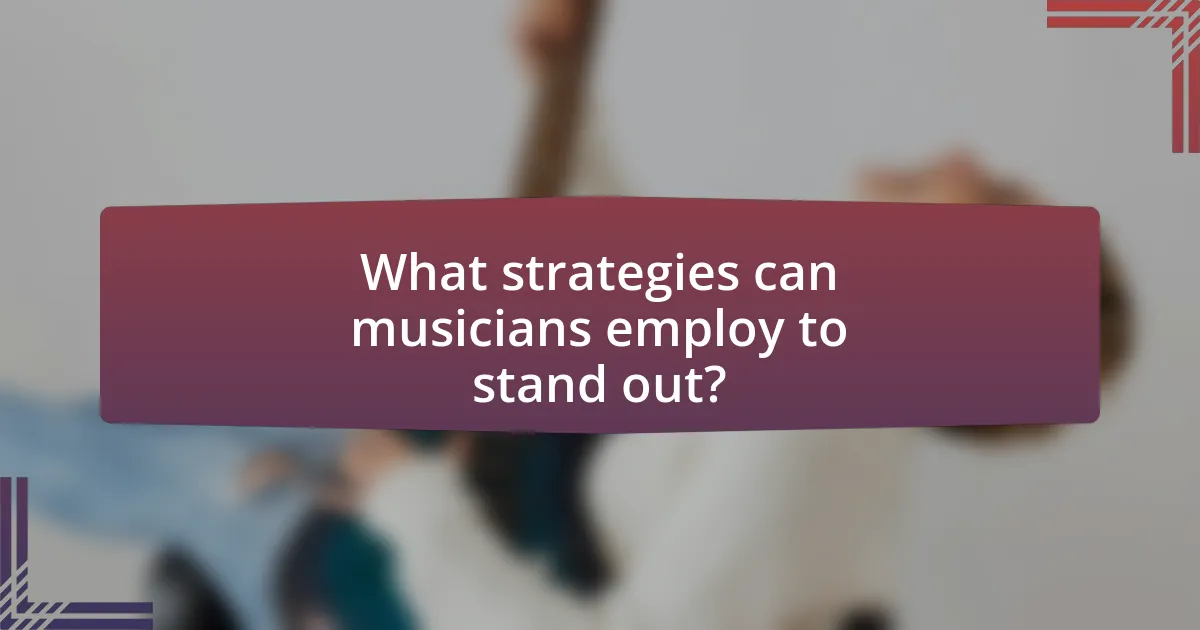
What strategies can musicians employ to stand out?
Musicians can employ unique branding, innovative marketing techniques, and authentic engagement with their audience to stand out. Unique branding involves creating a distinct image and sound that differentiates the musician from others in the industry. Innovative marketing techniques, such as leveraging social media platforms and utilizing targeted advertising, can effectively reach potential fans. Authentic engagement, including direct interaction with fans through live streams or social media, fosters a loyal community. According to a 2021 report by the International Federation of the Phonographic Industry, artists who actively engage with their audience on social media see a 30% increase in fan retention, demonstrating the effectiveness of these strategies.
How can musicians leverage social media effectively?
Musicians can leverage social media effectively by creating engaging content that resonates with their audience and utilizing targeted advertising to reach potential fans. Engaging content includes behind-the-scenes videos, live performances, and interactive posts that encourage audience participation, which can increase follower engagement by up to 50% according to a study by Sprout Social. Additionally, targeted advertising on platforms like Facebook and Instagram allows musicians to reach specific demographics, enhancing their visibility in a saturated market. This strategic approach not only builds a loyal fan base but also increases opportunities for collaboration and performance bookings.
What platforms are most beneficial for musicians to promote their work?
Social media platforms, particularly Instagram, TikTok, and Facebook, are most beneficial for musicians to promote their work. Instagram allows musicians to share visual content and engage with fans through stories and posts, while TikTok’s algorithm enables viral exposure for music snippets, making it a powerful tool for reaching new audiences. Facebook provides a platform for event promotion and community building, allowing musicians to connect with local fans and share updates. According to a 2021 report by the International Federation of the Phonographic Industry, 70% of music consumers discover new music through social media, highlighting the effectiveness of these platforms in promoting musical work.
How can musicians create engaging content that resonates with their audience?
Musicians can create engaging content that resonates with their audience by understanding their audience’s preferences and incorporating storytelling into their music and visuals. Research indicates that emotional storytelling can increase audience engagement by up to 65%, as it fosters a deeper connection between the artist and the listener. By utilizing social media platforms to share behind-the-scenes content, personal experiences, and interactive elements such as polls or Q&A sessions, musicians can enhance audience involvement and create a sense of community. Additionally, leveraging data analytics to track audience engagement metrics allows musicians to refine their content strategy effectively, ensuring that they consistently deliver what resonates most with their fans.
What role does branding play in a musician’s success?
Branding plays a crucial role in a musician’s success by establishing a unique identity that resonates with audiences. A strong brand helps musicians differentiate themselves in a saturated market, enabling them to create a loyal fan base. For instance, artists like Beyoncé and Taylor Swift have effectively utilized branding to cultivate distinct images and narratives that attract and retain listeners. Research indicates that musicians with a clear brand identity are more likely to achieve commercial success, as they can leverage their brand for marketing, merchandise, and collaborations, ultimately leading to increased revenue and visibility in the industry.
How can musicians develop a strong personal brand?
Musicians can develop a strong personal brand by clearly defining their unique identity and consistently communicating it across all platforms. This involves identifying their musical style, values, and target audience, which helps in creating a cohesive image that resonates with fans. For instance, artists like Billie Eilish have successfully built their brands by embracing authenticity and a distinctive visual aesthetic, which has garnered them a loyal following. Additionally, engaging with fans through social media and live performances reinforces their brand presence, as seen with artists who actively share behind-the-scenes content and personal stories. This strategic approach not only differentiates musicians in a saturated market but also fosters deeper connections with their audience.
What elements are essential for effective branding in music?
Essential elements for effective branding in music include a unique identity, consistent visual aesthetics, and a strong narrative. A unique identity differentiates an artist from others, making them memorable; for example, artists like Lady Gaga and Prince have distinct personas that resonate with audiences. Consistent visual aesthetics, such as album artwork and social media presence, create a cohesive brand image, as seen with Taylor Swift’s evolving yet recognizable style. A strong narrative connects emotionally with fans, allowing artists to share their stories and values, which has been crucial for artists like Billie Eilish in building a loyal following. These elements collectively enhance an artist’s visibility and appeal in a competitive market.
How can collaborations enhance a musician’s visibility?
Collaborations can significantly enhance a musician’s visibility by exposing them to new audiences and leveraging the fan bases of their collaborators. When musicians work together, they combine their reach, which can lead to increased streaming numbers, social media engagement, and concert attendance. For instance, a study by Nielsen Music found that collaborations often result in higher chart positions, as seen with tracks like “Sicko Mode” by Travis Scott featuring Drake, which gained massive popularity due to both artists’ established fan bases. This synergy not only broadens a musician’s exposure but also fosters networking opportunities within the industry, further amplifying their presence in a competitive market.
What types of collaborations are most effective for musicians?
Effective collaborations for musicians include cross-genre partnerships, featuring guest artists, and engaging in co-writing sessions. Cross-genre collaborations expand audience reach and introduce diverse sounds, as seen in the success of artists like Lil Nas X, who blended country and hip-hop, resulting in widespread acclaim and chart-topping hits. Featuring guest artists can enhance a track’s appeal; for example, the collaboration between Ed Sheeran and Justin Bieber on “I Don’t Care” significantly boosted its popularity. Co-writing sessions foster creativity and innovation, often leading to higher-quality music, as evidenced by the collaborative efforts of songwriters like Sia and Greg Kurstin, who have produced numerous hits together. These collaboration types not only enhance musical diversity but also increase visibility and marketability in a competitive industry.
How can musicians choose the right partners for collaboration?
Musicians can choose the right partners for collaboration by assessing compatibility in musical style, goals, and work ethic. Compatibility ensures that both parties can create cohesive and innovative music together, which is essential in a saturated market. For instance, a study by the Berklee College of Music highlights that successful collaborations often stem from shared artistic visions and complementary skills, leading to more impactful projects. Additionally, musicians should consider past collaboration experiences and feedback from peers to gauge potential partners’ reliability and professionalism. This strategic approach increases the likelihood of fruitful partnerships that enhance visibility and creativity in the competitive music industry.
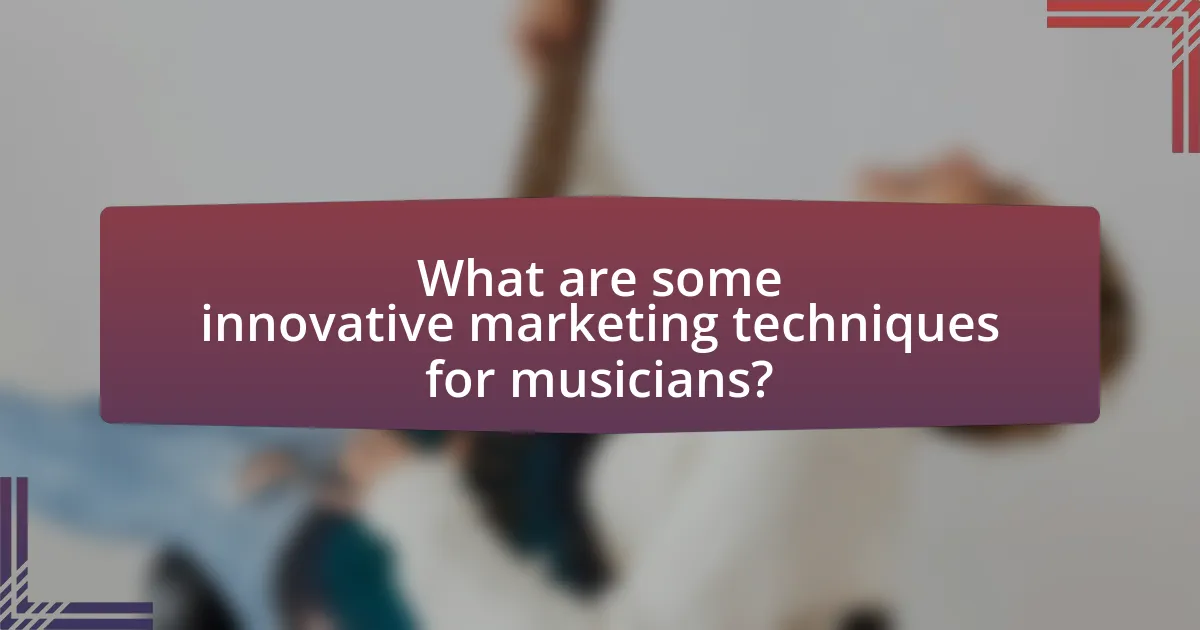
What are some innovative marketing techniques for musicians?
Innovative marketing techniques for musicians include leveraging social media platforms for targeted advertising, utilizing live streaming for virtual concerts, and creating interactive content such as polls or challenges to engage fans. Social media advertising allows musicians to reach specific demographics, increasing the likelihood of fan conversion; for instance, Facebook and Instagram ads can be tailored to target users based on their music preferences. Live streaming has gained popularity, especially during the pandemic, with platforms like Twitch and YouTube enabling artists to perform live and interact with fans in real-time, fostering a sense of community. Additionally, interactive content encourages fan participation, which can enhance loyalty and increase visibility; for example, TikTok challenges have led to viral trends that significantly boost an artist’s exposure.
How can musicians utilize live performances to build a fanbase?
Musicians can utilize live performances to build a fanbase by creating memorable experiences that engage audiences and foster connections. Engaging performances, such as interactive elements or unique stage presence, can leave a lasting impression, encouraging attendees to follow the artist on social media or attend future shows. According to a study by Eventbrite, 78% of concertgoers reported that live music experiences made them feel more connected to the artist, highlighting the importance of emotional engagement in building a loyal fanbase. Additionally, musicians can leverage merchandise sales and email sign-ups during performances to capture audience interest and convert attendees into dedicated fans.
What strategies can enhance the impact of live shows?
To enhance the impact of live shows, musicians should focus on audience engagement, unique performance elements, and effective marketing strategies. Engaging the audience through interactive elements, such as Q&A sessions or social media integration, fosters a deeper connection and increases retention. Incorporating unique performance elements, like visual effects or guest appearances, differentiates the show and captivates the audience’s attention. Additionally, effective marketing strategies, including targeted social media campaigns and collaborations with influencers, can significantly boost attendance and create buzz around the event. These approaches are supported by studies indicating that audience interaction and innovative presentations lead to higher satisfaction and repeat attendance rates.
How can musicians engage with their audience during performances?
Musicians can engage with their audience during performances by incorporating interactive elements such as call-and-response, storytelling, and audience participation. These techniques foster a connection between the performer and the audience, enhancing the overall experience. For instance, studies show that live performances that include audience interaction can increase emotional engagement, leading to higher satisfaction rates among concertgoers. Additionally, musicians who share personal stories or anecdotes related to their songs create a more relatable atmosphere, which can deepen the audience’s connection to the music.
What are the benefits of using digital platforms for music distribution?
Digital platforms for music distribution offer musicians increased reach, cost-effectiveness, and data analytics. These platforms enable artists to distribute their music globally without the need for physical copies, significantly reducing overhead costs associated with traditional distribution methods. For instance, services like Spotify and Apple Music allow artists to upload their tracks directly, reaching millions of listeners instantly. Additionally, digital platforms provide valuable insights into listener demographics and engagement, allowing musicians to tailor their marketing strategies effectively. According to a report by the International Federation of the Phonographic Industry (IFPI), digital music revenues accounted for 62% of the global recorded music market in 2020, highlighting the importance of these platforms in modern music distribution.
How can musicians choose the right digital distribution services?
Musicians can choose the right digital distribution services by evaluating factors such as distribution reach, pricing structure, and additional services offered. A comprehensive analysis of distribution reach ensures that the chosen service can effectively deliver music to major platforms like Spotify, Apple Music, and Amazon Music, maximizing audience exposure. Pricing structures vary significantly; some services charge per release while others take a percentage of royalties, so musicians should select a model that aligns with their financial strategy. Additionally, services that provide marketing tools, analytics, and support can enhance a musician’s ability to promote their music effectively. For instance, DistroKid offers unlimited uploads for a flat annual fee, while TuneCore charges per release but provides detailed sales reports, allowing musicians to make informed decisions based on their specific needs and goals.
What strategies can maximize exposure on streaming platforms?
To maximize exposure on streaming platforms, musicians should focus on optimizing their profiles, engaging with their audience, and leveraging social media. Optimizing profiles includes using high-quality images, writing compelling bios, and ensuring consistent branding across platforms. Engaging with the audience through regular updates, live sessions, and responding to comments fosters a loyal fan base. Leveraging social media allows musicians to promote their music, share behind-the-scenes content, and collaborate with other artists, which can significantly increase visibility. According to a study by Nielsen Music, artists who actively engage with fans on social media see a 50% increase in streaming activity.
What practical tips can musicians follow to stand out in a saturated market?
Musicians can stand out in a saturated market by developing a unique brand identity that resonates with their target audience. This involves creating a distinctive visual style, consistent messaging, and a compelling narrative that reflects their personal story and artistic vision. For instance, artists like Billie Eilish have successfully differentiated themselves through their unique aesthetics and relatable themes, which have garnered them a dedicated fan base. Additionally, leveraging social media platforms effectively allows musicians to engage directly with fans, share behind-the-scenes content, and showcase their personality, further enhancing their visibility. According to a 2021 report by MIDiA Research, 70% of music fans discover new artists through social media, highlighting its importance in building a following. By combining a strong brand identity with active social media engagement, musicians can effectively carve out their niche in a crowded marketplace.
How can musicians continuously evolve their sound and style?
Musicians can continuously evolve their sound and style by experimenting with diverse genres, collaborating with other artists, and incorporating new technologies into their music production. For instance, artists like Billie Eilish have successfully blended pop with electronic and alternative influences, showcasing versatility and innovation. Additionally, collaborations, such as those between Lil Nas X and various genre artists, allow musicians to explore different musical landscapes and reach broader audiences. The integration of technology, including software like Ableton Live and virtual instruments, enables musicians to create unique sounds that differentiate them in a saturated market.
What are the best practices for networking within the music industry?
The best practices for networking within the music industry include attending industry events, building genuine relationships, utilizing social media effectively, and collaborating with other artists. Attending events such as music festivals, conferences, and showcases allows musicians to meet industry professionals and peers, fostering connections that can lead to opportunities. Building genuine relationships is crucial; networking should focus on mutual support rather than transactional interactions, as trust and rapport can lead to long-term collaborations. Utilizing social media platforms like Instagram, Twitter, and LinkedIn enables musicians to showcase their work, engage with fans, and connect with industry insiders. Collaborating with other artists not only expands a musician’s reach but also introduces them to new networks, enhancing visibility. These practices are supported by the fact that 85% of jobs in the music industry are filled through networking, highlighting the importance of building a strong professional network.
